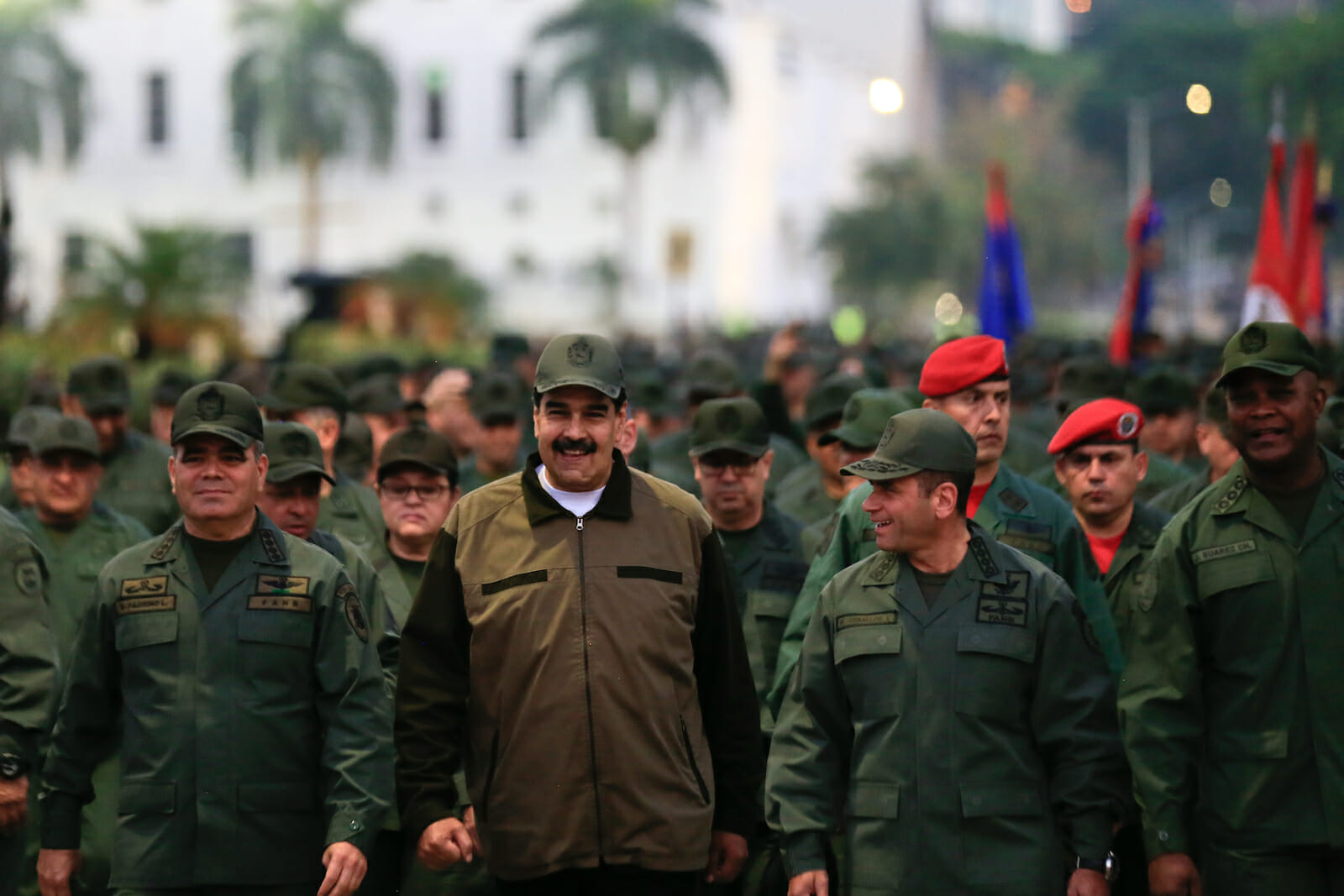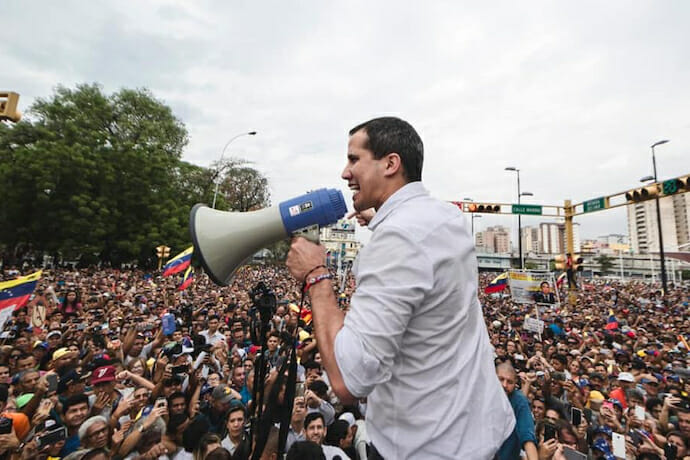
Venezuela Needs Some Sun Tzu
Clausewitz may be good for the battlefield, but for everything that happens off the field, one should follow Sun Tzu. In fact, Sun Tzu’s whole philosophy was to attain political objectives without ever firing a bullet or spilling blood. “The supreme art of war is to subdue the enemy without fighting,” he wrote in his famed military treatise, The Art of War. President Trump should be well aware of this quote—he tweeted it out in July 2012.
Recent foreign policy proposals for Venezuela from the White House echo neither Sun Tzu nor any other military philosopher. Current U.S. strategy resembles a jumbled mess of insinuations and accusations coming from the Trump administration. During a CBS interview, President Trump said that military intervention was still an “option.” U.S. National Security Advisor, John Bolton, supported his boss when he prominently and playfully scrawled “5,000 troops to Colombia” on a notebook that was visible during an interview.
“The Supreme Art of war is to subdue the enemy without fighting.” — Sun Tzu
— Donald J. Trump (@realDonaldTrump) July 17, 2012
Concurrently, administration officials have accused Cuba of propping up Maduro and his failing regime. Not only does Cuba import Venezuelan oil, but it also provides the embattled regime with military and intelligence support, they argue. Looking for more bad guys in this crusade for justice, U.S. Secretary of State Mike Pompeo also accused Russia’s Putin and China’s Xi of backing Maduro. (These countries certainly do not look innocent. Cuba, Russia, China, and Iran all sent diplomatic delegations to Venezuela to reinforce Maduro’s rule and provide humanitarian aid.) Lastly, Vice President Pence promised that “[a]ll options are on the table” to oust Maduro—without providing much specificity.
This mixed signaling and confusion have been replicated in Venezuela as well. Amidst hyperinflation, a mass exodus of Venezuelans leaving for neighboring countries, and a humanitarian crisis on an epic scale, opposition leader Juan Guaidó declared himself the country’s interim and de facto leader. For the past few months, Guaidó and Maduro have been fighting for power. The closest Guaidó came to a breakthrough was in late April, when he tried to initiate a popular uprising to topple the regime. The plan fell apart when three leading Venezuelan officials decided to stay with the regime and, thus, thwarted the coup’s momentum. As “Operación Libertad” failed, Maduro touted his unabashed victory.
More than a month after the “attempted coup,” little news has come out of Venezuela—except more reports of mass suffering.
If the U.S. wants to successfully oust Maduro it needs to do two things. First, it must apprehend the strategic importance of the country and the broader Latin American region. Second, the U.S. must develop and execute options that avoid any military dimension and, rather, embody Sun Tzu’s wisdom and advice.
“In the midst of chaos, there is also opportunity.”
Amidst an economic collapse, a paucity of food and medicine, an authoritarian regime, and more than two million citizens fleeing the country, there is a chance for Venezuela to emerge stronger and better than at any time under Maduro. The present situation has gotten so bad that the status quo is unsustainable. But why should Americans care what happens in Venezuela, to begin with? There are four reasons: geopolitical adversaries, transnational threats, geographical positioning, and humanitarian obligations.
First, geopolitical. While it is difficult to discern whether Russia and China are bogeymen or real threats in Venezuela, both powers will benefit if Maduro stays in power, which is why they currently back him.
After the failed April coup, Pompeo suggested that Maduro was ready to fly to Cuba when Russian officials urged him to stay in power and remain in Venezuela. Why the interference? In December 2018, The Washington Post reported that Russia owned “substantial portions of Venezuelan oil fields, which it got in exchange for loans and bailouts over the past decade.” Venezuela also “signed over almost half of Citgo” as “collateral to Rosneft,” Russia’s state-backed oil giant for $1.5 billion. The report concluded that Rosneft had assets totaling $20 billion in Venezuela, which they would lose if Maduro’s regime fell.

Russia and other American adversaries have also paid more attention to Venezuela because of its natural resources. It possesses oil and uranium and will “engage in arms trade and nuclear cooperation with countries that do not align with U.S. interests.” As the U.S. shifts to an era of great power competition, it becomes incumbent for its leaders to focus on countering Russia, Iran, and China from exploiting and influencing countries in its own hemisphere. Moreover, even though U.S.-Venezuela relations have been fraught for more than a decade, it has remained a stable partner in oil trading. While America’s oil dependency has diminished due to its own domestic production, it is vitally important that our adversaries do not wield undue influence over a nation with the world’s largest verified oil reserves.
Second, transnational. A 2017 report by Roger Noriega at the American Enterprise Institute confirmed the transnational organized crime that brews in the Americas—especially in Venezuela, where key government officials participate in international crimes and use the state’s oil company, PDVSA, and military tools to foster drug smuggling, money laundering, gang activity, and government corruption. Some officials, including Vice President Tareck El Aissami, have been targeted by the U.S. for working with Hezbollah and Iran. Besides collaborating with “bad actors,” Venezuela’s deteriorating condition “enables criminal networks to operate,” which directly threatens American “national security and health concerns” because of their proximity to one another.
Third, geographical. While Cuba is a short 90 miles from Florida; Venezuela is only 1,300 miles from Florida. (That is just about the distance from New York City to New Orleans.) Venezuelan instability—whether its economic turmoil or refugee crisis—could surely spread throughout the region, affecting countries like the U.S. For decades, U.S. presidents have recognized the importance of quelling instability in the Americas. In 2000, the Clinton administration initiated Plan Colombia: a U.S. initiative designed to crush Colombian drug cartels and destabilizing groups like FARC. Sixteen years later, with a peace deal on the horizon, Colombian President Juan Manuel Santos accredited the initiative with bringing peace to a fragile Colombia and reducing crime in the region. U.S. policymakers must apprehend now, as they did in 2000, that if Venezuela becomes a failed state, it could “trigger serious economic, financial, and security risks for its neighbors,” including the U.S.
Fourth, humanitarian. In recent years, 90 percent of Venezuelans live below the poverty line and more than half are unable to “meet basic food needs,” according to Mercy Corps. The health system has also deteriorated. 13,000 doctors have left Venezuela since 2015. According to the World Health Organization (WHO), a once-treatable disease like malaria has seen cases skyrocket from 36,000 in 2009 to 414,000 in 2017—a 1,050 percent increase. These deteriorating conditions cannot be ameliorated under the Maduro regime.
The bottom line is clear: the U.S. has a major strategic interest in the future of Venezuela. But is there a way for us to shape the final result? Moises Rendon of CSIS wrote that the two main drivers that will “influence the outcome” will be “the degree of the regime’s internal instability and the degree and types of external pressure or assistance the regime receives from key international actors.” This seems about right. As mentioned earlier, the regime’s instability cannot get much worse. Therefore, U.S. and Western policymakers should focus on judiciously applying external pressure. Through this horrific crisis, they have an opportunity to stop Maduro.
“Supreme excellence consists of breaking the enemy’s resistance without fighting.”
A U.S. military intervention has to be ruled out. Similar to operations in Afghanistan and Iraq, U.S. forces would likely overwhelm Venezuela’s malnourished and poorly-equipped military. The old adage, three time’s a charm, may work for some situations—this is not one of them. Even if the invasion was successful, that would only be a quarter of the battle. As it tried to transition Venezuela to democracy, U.S. forces would likely “face thousands of armed paramilitary groups mounting rearguard attacks.” A military invasion of Venezuela would not only create unresolvable after-work for the U.S. military and government, but it would also be counterproductive: fomenting violence instead of fostering peace.
Avoiding a military option, policymakers must utilize soft power and subtle means of coercion and influence. They must identify the Maduro regime’s pressure points and weaknesses. Then, and only then, can the U.S. break the regime. Andres Bello Catholic University professor Carlos Calatrava explained that the military acts as such a pressure point since it is the only thing keeping Maduro in power. Both Maduro and his predecessor, Hugo Chávez, “coup-proofed” the military by guaranteeing loyalty via greed, extortion, and intimidation and integrating Cuban-trained spies in the military to monitor morale. Even if Maduro appears weak and can no longer pay off his generals as much as he used to, these same military leaders have stuck with their dear leader not out of love, but because they fear for their own future. Numerous commanders are complicit in illicit activities—and the U.S. has publicly accused them of “drug trafficking, money laundering, and black market dealings.” These commanders feel that “in a transition to democracy, they all will end up on trial,” according to Harold Trinkunas, a senior research scholar at Stanford University.
If the military is Maduro’s lifeline and its leaders only support Maduro because they fear retribution if the regime falls, then the solution is clear. The U.S. does not need to fight these commanders, it needs to engage them, bargain with them. While Guaidó proposed a law that would offer amnesty to those in uniform who support his government, such an appeal is lukewarm and not enough.
“Build your opponent a golden bridge to retreat across.”
To convince key generals to switch sides and join the opposition, both the Venezuelan opposition and the Trump administration have to do more in the spirit of Sun Tzu. They have to convince the commanders that there is a role for them in a new, democratic Venezuela that does not end behind bars. Maduro and his closest compadres must go, of course, but other military leaders should play a role in a transitional government and a new Venezuela.
Hardliners in the White House like Bolton would probably never agree to this. They would refuse to offer amnesty or sustained power to leaders who engage in criminal activity. In this case, however, it may be the lesser of two evils. Part of Colombia’s 2017 peace process meant that the government (under Santos) would have to integrate dangerous FARC leaders into the political process.
As evidenced by the deterioration of Venezuela in the past five years, most of these generals care more about their own lives than their country. The U.S. should exploit this weakness by giving them a “golden bridge”—a future in their home country. And Trump’s provocateurs should back Guaidó in this pursuit.
Some opponents of this initiative argue that Venezuelan generals have no reason to trust the U.S. Not only has the U.S. betrayed its promises and commitments in the past, but Venezuelans are also conditioned to view the U.S. as a nefarious, imperialist power. To signal his nation’s benign intent, Trump should replace Elliott Abrams as the special envoy to Venezuela. Abrams is an experienced Washington insider but, perhaps, not the best person to represent the U.S., considering his involvement in the Iran-Contra scandal and leading role in the Iraq War. With Abrams spearheading the American effort, the U.S. cannot reasonably prove to Venezuelan commanders that it will honor its promises or act in good faith. Following this change in leadership, Venezuelan leaders will then have to make a choice: a new Venezuelan government backed by a “duplicitous” power that guarantees them continued power or a crumbling regime that has starved its citizens, bankrupted the economy, and can never return to better times.
I have a hunch these Venezuelan military generals may choose the former. Why? Because if I were in their situation, I would choose the former. And as Sun Tzu once wrote, “To know your Enemy, you must become your enemy.”

